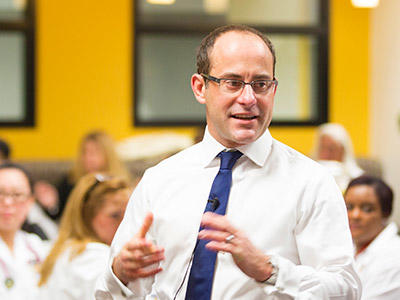Featured
Tags
Share

Ask nearly any nurse educator about teaching, and they will tell you about the joy that an ‘a-ha’ moment can bring.
“My favorite part of teaching is seeing connections made,” said Donna Castellani, an adjunct professor at New Jersey City University. “I love seeing the light bulbs go on when a student realizes that they’ve got it, it’s making sense and they can associate their experiences with that learning.”
Along with the personal gratification that comes from witnessing student growth and transformation, nurse educators also benefit from flexible schedules, a varied and ever-changing work environment and much more.
We recently connected with several nurse educators to learn why more nurses may want to consider a teaching role this year.
1. Be in Demand
Nursing schools in the U.S. turned away nearly 69,000 qualified student applicants in 2014, according to a recent report from the American Association of Colleges of Nursing (AACN).
Robert Rosseter, spokesperson for AACN, says a shortage of faculty is continuing to limit growth in nursing programs nationwide.
“Almost two-thirds of all nursing schools responding to the survey reported the faculty shortage as a reason for not accommodating all qualified applicants in their programs,” he said. “In addition, a wave of faculty retirements is expected across the U.S. over the next decade, which may further diminish the population of nurse faculty.”
Lacey Turner found a variety of nursing educator and faculty opportunities available following her 2015 graduation from the Master of Science in Nursing (MSN) Educator Specialty Track at Chamberlain College of Nursing. Shortly after graduation, she accepted a position as an assistant professor of nursing at Middle Georgia State University.
“There is such a shortage of nursing educators and schools want new faculty with fresh ideas, who can bring in their insights and experience,” she said.
2. Inspire Other Nurses to Greatness
Castellani says she first knew she wanted to be a nurse educator when she started back to school in Chamberlain’s RN-BSN to MSN Online Option, Educator Specialty Track.
“During my second or third nursing course, I realized the excitement of learning had been sparked within me again,” she said. “The professors I had in the online environment were so knowledgeable and supportive that they inspired me to pursue teaching as a career. Quality nurses come from quality education. And quality education needs to have quality educators.”
As a teacher, the work you do outside of the classroom often leaves an even greater mark on students then the lessons inside the classroom.
“Being a nurse educator is so much more than just teaching,” Turner said. “We mentor our students, model professional nursing and encourage them to never stop learning. We’re there to guide students, inspire them, praise them when they do well, and help support them when they don’t do as well.”
3. Benefit from Lifelong Learning
As a nurse educator, you will have access to the most recent, cutting-edge information and research, benefit from opportunities to collaborate with other health professions, and learn from your students, as they in turn, learn from you.
“As a nurse faculty member, you are able to bring to your students your years of experience in a particular content area,” said educator Suzanne Miyamoto, senior director of government affairs and health policy at AACN. “What enriches the discussion further is the diversity and experiences they offer. Reciprocal learning is an invaluable part of being a nurse educator.”
4. Cast a Wider Net of Care
Mark Garcia was an RN on a telemetry unit when he felt himself gravitating toward the patient education aspect of nursing. Following graduation from Chamberlain’s MSN Educator Specialty Track in 2015, he joined the College as a full-time instructor at the Phoenix campus.
“What I wanted when I entered nursing was to help people,” he said. “Rather than being able to help four patients per shift as a floor nurse, now I can cast a wider net. If I can teach students how to treat people the way that I would like to be treated myself, I’m fulfilling my original goal in a bigger way.”
Carole Eldridge, vice president of post-licensure programs at Chamberlain, agrees. When looking back at her four decades in nursing, she counts her experiences in academia as the most fulfilling.
“I watched students mature into professional nurses, and saw my small influence growing and reaching thousands of patients,” she said. “I was struck by the enormity of what we were accomplishing together. Nursing faculty create a legacy that pays dividends for generations.”
5. Act as a Leader in the Nursing Profession
Nurse educators have the opportunity to shape the next generation of nursing leaders, influence policies and standards, and assist healthcare institutions.
“As a nurse educator, you get all the same satisfaction you would get from helping a patient, but you also get to change the profession moving forward,” Garcia said.
Interested in learning more about faculty positions available at Chamberlain College of Nursing? Visit http://www.chamberlainfaculty.com for more information.
By Chamberlain University
More from Home
Request More Information
To receive the Chamberlain University Program Guide, including associated career paths, please select a program of study.






